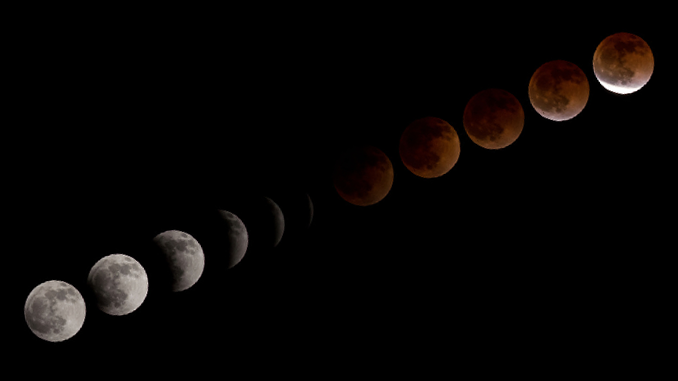
People have had a fascination with the moon throughout all of recorded history. Moon gods and goddesses populate every mythological pantheon, from Selene of the ancient Greeks to Anningan of the Inuits to Japan’s Tsukiyomi. It was the subject of some of the earliest science fiction stories. It’s the nearest celestial body to the Earth and it’s proven the easiest to investigate.
So, of course, astronomers have concocted terms to describe every potential peculiarity of its natural cycle. Tonight we have a few of them occurring simultaneously, producing a Super Blood Wolf Moon. While it sounds silly (or cool, depending on one’s perspective) it seemed like a good time to break down what the various terms mean.
New Moon: no moon visible in the sky at night. Okay, it’s really when the Sun and the Moon share the same ecliptic longitude, but I’m trying to keep this as simple to remember as possible.
Full Moon: the entire moon is visible in the sky at night (barring clouds, obviously. Don’t get nitpicky on me.)
Quarter Moon: Half the moon is visible. Which is, really, fairly counter-intuitive.
Crescent Moon: Less than half the moon is visible, but you can see something.
Gibbous Moon: The most unusual of the common moon terms, it’s anything between a Quarter Moon and a Full Moon.
Super Moon: This is when a full moon or new moon occurs while the moon is within 90% of its closest point to the Earth in its natural elliptical orbit. It makes the moon look big. It’s opposite is:
Micro Moon: When a full moon or new moon occurs while the moon is within 90% of its furthest point from Earth. It’s just as uncommon as a Super Moon, but people don’t seem to make much of a big deal about it.
Blood Moon: this is a popular term for when the moon experiences a total lunar eclipse. A lunar eclipse happens when the moon passes into the Earth’s shadow, and during a total lunar eclipse the moon often seems to glow red. Red color = Blood Moon
Penumbra / Umbra: Not really a moon term. An Earth term. But because it’s talking about the Earth’s shadow, the only time most people hear about it is during lunar eclipses. The penumbra is the dim outer edge of the shadow, the umbra is the very dark center of the shadow.
Blue Moon: the term for a fourth full moon to occur within a season, where most seasons have only three full moons. Or the term for a second full moon to occur within a given month. Pick your favorite definition and be prepared to argue on social media. Or just read this article from Space.com and realize that both are pretty much correct, these days.
Black Moon: The New Moon version of a Blue Moon, complete with dueling definitions. But people don’t usually care, because New Moons get about as much love from the non-astronomer community as Micro Moons do.
Wolf Moon: This is just talking about January, really. There’s a different term for each month.
- January – Wolf Moon
- February – Snow Moon / Hunger Moon
- March – Worm Moon / Lenten Moon
- April – Pink Moon
- May – Flower Moon
- June – Strawberry Moon
- July – Buck Moon
- August – Sturgeon Moon (which one would think might be named for the brilliant sf short-story writer Theodore Sturgeon, but no, it’s the fish)
- September – Harvest Moon
- October – Hunter’s Moon
- November – Beaver Moon
- December – Cold Moon
I think that covers all of the terms that are likely to appear in headlines of newspapers and web sites. As this piece goes live the Super Blood Wolf Moon will be just about at its peak. If it’s not cloudy, and you’re reading this tonight, I suggest you go outside and see what all the fuss is about. If the eclipse is over, you’ll still be seeing a Super Wolf Moon, which should still fill you with a touch of wonder at the immensity and complexity of our universe, but without the red tinge that encourages people to write articles like this one.
Question of the night: What’s your favorite werewolf story?
